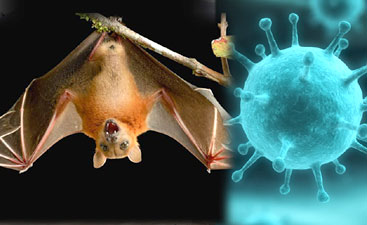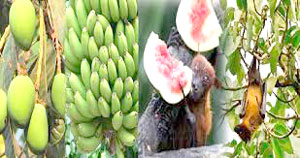Nipah virus is a rare, brain-damaging virus. Avoid consuming partly eaten fruits or unpasteurized fruit juices. Maintain personal hygiene

NIPAH VIRUS
Nipah virus is a rare, brain-damaging virus. Avoid consuming partly eaten fruits or unpasteurized fruit juices. Maintain personal hygiene
Nipah virus (NiV) infection is a newly emerging zoonosis. Zoonosis is an ailment that causes severe disease in both animals and humans. The natural host of the destructive virus are fruit bats of the Pteropodidae Family, Pteropus genus. it is regarded as a possible epidemic threat. The Nipah virus naturally resides in fruit bats across South and Southeast Asia, and can spread to humans through contact with the animals’ bodily fluids. Many of the past causes of the Nipah virus disease were provisionally diaganosed as Japanese Meningitis until the discovery of the newly envisioned Nipah Virus.
- What are its symptoms ?
Nipah virus is a rare, brain-damaging virus.It’s infection produces flu like symptoms, including fevers, body aches and vomiting, which often progress to acute respiratory syndrome and encephalitis, or brain inflammation. Some survivors show persistent neurological effects, including personality changes.
- Why the name Nipah and its history.
The infection was named as Nipah because it was first identified during an outbreak of disease that took place in Kampung Sungai Nipah, Malaysia in 1998. On this occasion, pigs were the intermediate hosts. However, in subsequent NiV outbreaks, there were no intermediate hosts. In Bangladesh in 2004, humans became infected with NiV as a result of consuming date palm sap that had been contaminated by infected fruit bats. Human-to-human transmission has also been documented, including in a hospital setting in India.
Thus it can be referred to as a contagious disease as it can spread from one person to other person.
- Recent Outbreaks
Recently Nipah has broken out in the state of Kerala, India, for the first time, infecting at least 18 people and killing 17 of them, according to the World Health Organization. In Kerala this virus has caused havoc. Due to high contagiousness of this virus people were too afraid. They even started isolating hospital staff in-charge of the patients suffering from Nipah. Some of the people even prohibited nurses from travelling in city buses. Even the embalmers or the undertakers in Kerala had refused to bury the dead bodies of the people dead from this ailment. However things are in control there now due to certain preventive measures as issued by the government.
- Is there any cure for Nipah ?
Due to Nipah being a new disease it has not been thoroughly studied and understood well. Thus it does not have any cure right now as such. Only prevention is the beneficial cure.Thus it is important to state to each and every person of this world about this disease. Current treatment measures are insufficient, according to Dr. Stuart Nichol, the head of the viral special pathogens branch at the Centers for Disease Control and Prevention.“There’s a market failure for protecting people from this,” said Dr. Steve Luby, an epidemiologist at Stanford University. “It’s not like treating baldness or breast cancer, where wealthy people will pay for your product. There’s no big customer here, no incentive, until it escalates.” The only option for infected people is intensive supportive care.There is a four to 14 day incubation period for a person, though it has been known to stretch to more than 45 days.
Symptoms can also remain hidden for long periods of time before developing into serious complications.
Authorities warned people to remain quarantined and seek immediate medical assistance if you suspect you have contracted Nipah virus.
- Preventive Measures Necessary
Here is how to avoid contracting Nipah Virus
- Avoid close (unprotected) physical contact with infected people
- Wear NH95-grade and higher masks
- Wash hands regularly with soap
- Avoid consuming partly eaten fruits or unpasteurised fruit juices
- Avoid being around animal pens
- Boil freshly collected date palm juice before consuming
- Thoroughly wash and peel fruits before consuming
- Maintain your and children’s personal hygiene
- Cover your household properly
509 total views , 1 views today


